Related Research Articles
Memorization is the process of committing something to memory. It is a mental process undertaken in order to store in memory for later recall visual, auditory, or tactical information.
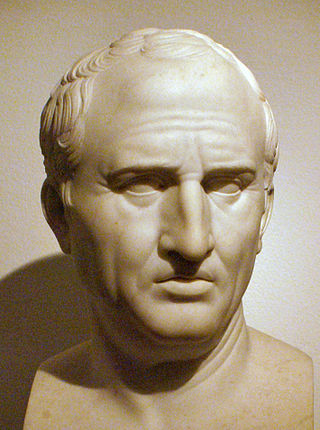
The method of loci is a strategy for memory enhancement, which uses visualizations of familiar spatial environments in order to enhance the recall of information. The method of loci is also known as the memory journey, memory palace, journey method, memory spaces, or mind palace technique. This method is a mnemonic device adopted in ancient Roman and Greek rhetorical treatises. Many memory contest champions report using this technique to recall faces, digits, and lists of words.
The title mnemonist refers to an individual with the ability to remember and recall unusually long lists of data, such as unfamiliar names, lists of numbers, entries in books, etc. Some mnemonists also memorize texts such as long poems, speeches, or even entire books of fiction or non-fiction. The term is derived from the term mnemonic, which refers to a strategy to support remembering, but not all mnemonists report using mnemonics. Mnemonists may have superior innate ability to recall or remember, in addition to relying on techniques.
The art of memory is any of a number of loosely associated mnemonic principles and techniques used to organize memory impressions, improve recall, and assist in the combination and 'invention' of ideas. An alternative term is "Ars Memorativa" which is also translated as "art of memory" although its more literal meaning is "Memorative Art". It is also referred to as mnemotechnics. It is an 'art' in the Aristotelian sense, which is to say a method or set of prescriptions that adds order and discipline to the pragmatic, natural activities of human beings. It has existed as a recognized group of principles and techniques since at least as early as the middle of the first millennium BCE, and was usually associated with training in rhetoric or logic, but variants of the art were employed in other contexts, particularly the religious and the magical.
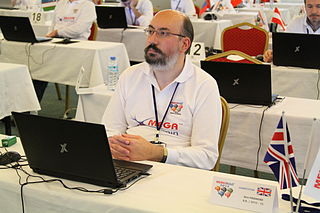
Ben Pridmore is a former world memory champion, memory sport competitor and accountant.

The World Memory Championships is an organized competition of memory sports in which competitors memorize as much information as possible within a given period of time. The championship has taken place annually since 1991, with the exception of 1992. It was originated by Tony Buzan and co founded by Tony Buzan and Ray Keene. It continues to be organized by the World Memory Sports Council (WMSC), which was jointly founded by Tony Buzan and Ray Keene. In 2016, due to a dispute between some players and the WMSC, the International Association of Memory (IAM) was launched. From 2017 onward, both organizations have hosted their own world championships.

Clemens Mayer is a German memory sports person. He was World Memory Champion in 2005 and 2006. At the age of 19 years and 10 months, he became the youngest-ever world memory champion in 2005. 12 years later, in 2017, then-18-year- and 11-month-old Mongolian Munkhshur Narmandakh became the youngest champion ever and Mayer lost this record. Narmandakh lost this record to Wei Qinru who won the 2018 world championships at age 14.
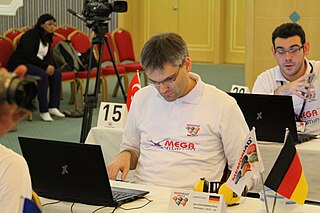
Jan van Koningsveld is a mental calculator.
Exceptional memory is the ability to have accurate and detailed recall in a variety of ways, including hyperthymesia, eidetic memory, synesthesia, and emotional memory. Exceptional memory is also prevalent in those with savant syndrome and mnemonists.
Memory sport, sometimes referred to as competitive memory or the mind sport of memory, refers to competitions in which participants attempt to memorize then recall different forms of information, under certain guidelines. The sport has been formally developed since 1991 and features national and international championships. The primary worldwide organizational bodies are the IAM and WMSC.
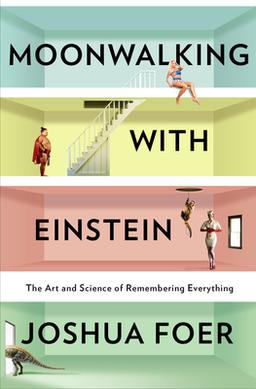
Moonwalking with Einstein: The Art and Science of Remembering Everything is a nonfiction book by Joshua Foer, first published in 2011. Moonwalking with Einstein debuted at number 3 on the New York Times bestseller list and stayed on the list for 8 weeks.

Nelson Charles Dellis is an American memory athlete and consultant. He is a five-time USA Memory Champion, holding the record for most wins of the national memory champion title. He is also one of the co-founders of Memory League. Nelson also runs Climb 4 Memory - a nonprofit which "aims to raise funds and awareness for Alzheimer's disease research through mountain climbs around the world."
Chester Santos is a memory expert and motivational speaker best known for winning the USA Memory Championship. He has been profiled in numerous publications and media outlets such as The New York Times, The Wall Street Journal, The Washington Post, NBC, CBS, CNN, PBS, Business Week, USA Today, Yahoo! News, Google News, Wired magazine, Reuters and Sports Illustrated. His interview with CNN was featured on the VH1 show “The Best Week Ever”.
The USA Memory Championship is an annual competition that took place every spring in New York City until 2016, and is currently held in Orlando, Florida, after an online qualifier. It was founded by Tony Dottino, President of Dottino Consulting Group, Inc., and Marshall Tarley in 1997. Designed to test the limits of the human brain, the USA Memory Championship is an organized competition in which Memory Athletes (MAs) attempt to memorize as much information as possible in events such as Names and Faces, Cards, Random Numbers, Images, and guest information at a fictional "Tea Party". Since 2018, there is also often an event called Long-Term Memory in which the MAs are given reams of data a month in advance about a wide variety of subjects such as the Periodic table of the elements, Space Shuttle missions, NFL Hall-of-Famers, etc. Participation is open to US citizens who are at least 12 years of age. The competition currently consists of 9 total events, 5 of which are online qualifying events, while the last four events are held at a live event to determine the champion.

Alex Mullen is an American memory competitor, three-time world memory champion, and physician. The first American to win the world title, he won for three consecutive years the 2015, 2016, and 2017 World Memory Championships and held the IAM world No. 1 ranking from 2016-2019. He was also the 2022 and 2023 Memory League World Champion. Along with his wife, he runs Mullen Memory - a nonprofit which "provides free resources exploring memory palaces as learning tools."
Memory League is a memory competition platform originally founded and created by Nelson Dellis and Simon Orton under the name Extreme Memory Tournament (XMT).
Yänjaa Wintersoul, sometimes known as simply Yanjaa, is a Mongolian–Swedish triple world record-breaking memory champion and polyglot. She is one of only 22 international grandmasters of memory. She first rose to prominence in memory sports in 2014 by winning the team gold medal as well as first place in names and faces at the World Memory Championships 2014 in Haikou, China during her first year of memory training.
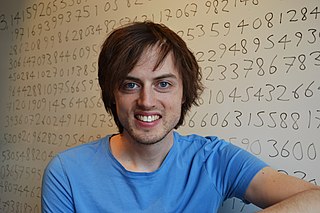
Baron Jonas von Essen is a Swedish, two-time world memory champion. He was a memory sports player from 2012 to 2015. In April 2019 he co-founded memoryOS, an ed-tech startup developing memory improvement software.
The International Association of Memory (IAM) is an international organization that connects the various national memory sport federations and acts as a governing body of international memory competition. The IAM was founded on 5 July 2016 and has its headquarters in Munich, Germany.

Andrea Muzii is an Italian memory competitor, former speedcuber, 3 times European Memory Champion, who became IAM World Memory Champion in 2019 and IAM World No.1 ranked athlete. He was the first memory athlete to achieve the IAM title of Grandmaster of Memory-Gold.
References
- ↑ "World Memory Championship 2018 | International Association of Memory Statistics". www.iam-stats.org. Retrieved 2018-12-19.
- 1 2 "World Memory Championships 2018 (Combined)". 2023-05-19. Archived from the original on 2023-05-19. Retrieved 2024-04-01.
- ↑ "World Memory Championship 2018 | International Association of Memory Statistics". www.iam-stats.org. Retrieved 2018-12-19.
- ↑ 2016 XMT Results
- ↑ RESULTS OF MEMORIAD - 2012
- ↑ "The Beautiful Mind of Johannes Mallow". Are We Europe. 30 March 2021. Retrieved 2022-01-21.